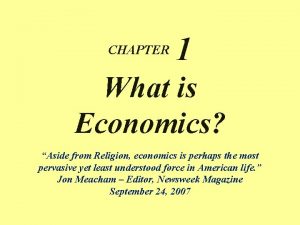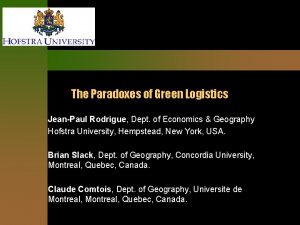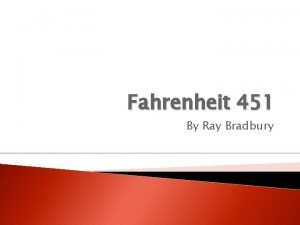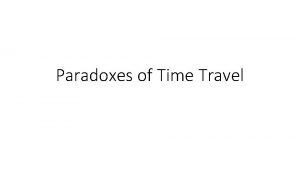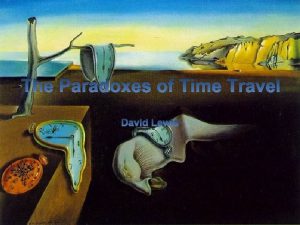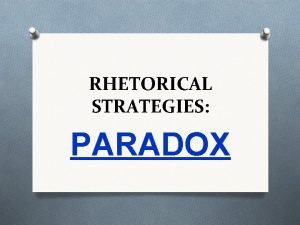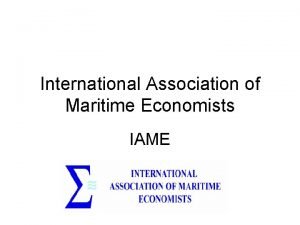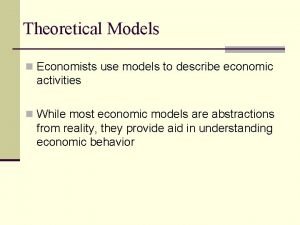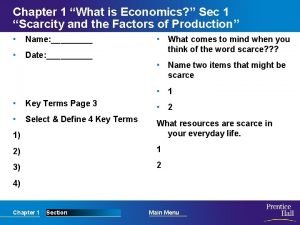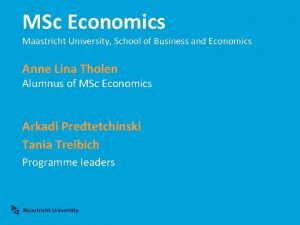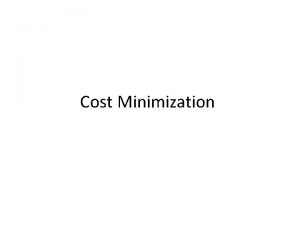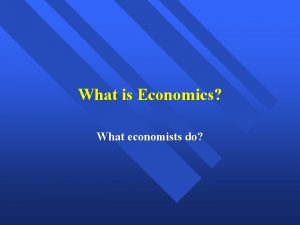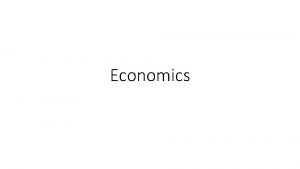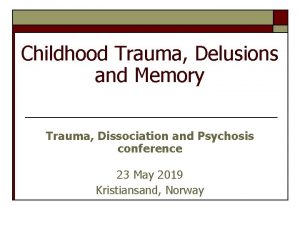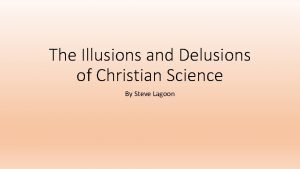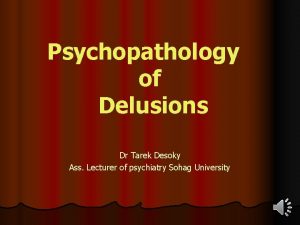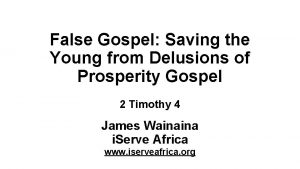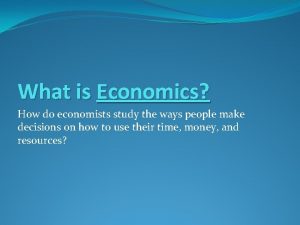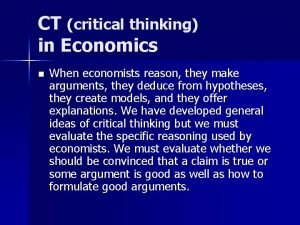The Paradoxes and Delusions of Economics When economists

























- Slides: 25

The Paradoxes and Delusions of Economics: When economists believe in things that they don´t understand then we suffer Paradox : Delusion : when real world data and phenomena totally contradict what is expected by theory when desirable outcomes cannot be achieved using policy based on economic theory

Examples: War is good for the Economy The ideas that the ´invisible hand´ allocates resources in a societally optimal way seems to be refuted by the fact that while 12% of the human population is overweight or obese there is another 12% of the population that is barely surviving or actually starving to death from undernourishment.

A group of eminent economists has written to the Queen explaining why no one foresaw the timing, extent and severity of the recession. The three-page missive, which blames "a failure of the collective imagination of many bright people", was sent after the Queen asked, during a visit to the London School of Economics, why no one had predicted the credit crunch.

A chronological history of the main paradoxes and delusions of mainstream Economics


1865 The Jevons paradox and the dematerialization delusion. Increasing efficiency in coal use did not correspond to a diminished consumption of coal. Instead, the contrary is true. Improvements of the steam engine were accelerating the overall consumption of coal.

1865 The Jevons paradox and the dematerialization delusion. Increasing efficiency in coal use did not correspond to a diminished consumption of coal. Instead, the contrary is true. Improvements of the steam engine were accelerating the overall consumption of coal. data: World Bank Open Data (available at: http: //data. worldbank. org/)

theconversation. com James Ward et al. …this “decoupling” of energy sector emissions and economic growth should put to rest the argument that combating climate change requires accepting lower growth or a lower standard of living.

… about blind Technological optimism

1972 The Limits to Growth, Planetary Boundaries, and the delusion of infinite growth adapted from Turner, 2008, Global Environmental Change 18, 397 -411.




1974 Worldwide (cross-country) The Easterlin paradox and the delusion of money equals happiness Above a certain threshold, economic welfare is not related to well-being and happiness. data: World Bank Open Data (available at: http: //data. worldbank. org/) and the World Happiness Report 2017

Hedonic treadmill (Easterlin, Kahneman, Frank) (hedonic adaptation – social comparison)

www. worldvaluessurvey. org Inglehart et al. (2008) Development, Freedom, and Rising Happiness. A Global Perspective (1981 -2007). Perspectives on Psychological Science, 3 (4), 264 -285.

10. 000 / 15. 000 $ per capita “Beyond this point, a rational strategy would be to place increasing emphasis on quality of life concerns, rather than to continue the inflexible pursuit of economic growth as if it were a good in itself”

1990 The Lucas paradox and the delusion of glory of globalization. In the global market, capital is expected to flow from rich to poor countries, thus leading to convergence in income and High-income countries are the recipient of around 99% of total net foreign investments made globally. economic welfare. data: World Bank Open Data (available at: http: //data. worldbank. org/)

2009 https: //www. equalitytrust. org. uk/about-inequality/impacts Social mobility Inequality is detrimental for the whole society.

2009 https: //www. equalitytrust. org. uk/about-inequality/impacts Crime Inequality is detrimental for the whole society.

2009 Inequality is detrimental for the whole society. https: //www. equalitytrust. org. uk/about-inequality/impacts Happiness

2013 The composition of global inequality has drastically changed: From within-country inequality (or “class” inequality) To cross-country inequality (or “location/citizenship-based” inequality) Inequality has always been increasing (except during the World Wars) and is a natural characteristics of modern economic functioning. data: Milanovic, 2001, Explorations in Economic History 48, 494 -506.

2009 The Ultimate Paradox of Economics ? 2013 “Empirical assessment of economic history links economic growth with increasing inequality, which is in turn linked with worsening well-being for the overall society”. Inequality is detrimental for the Inequality has always been whole society. increasing (except during the World Wars) and is a natural characteristics of modern economic functioning.

How are the G 7 countries performing for some of the most relevant environmental, social and well-being indicators?

Reforming Global Economy Leadership : the We-All Initiative The Wellbeing Economies Alliance is a joint initiative by currently five countries: Costa Rica, New Zealand, Scotland, Slovenia, and Sweden. It will launch officially in spring 2018. In October 2017, at an initial meeting in Glasgow on the side-lines of the Scottish Government’s Inclusive Growth Conference on 20 October 2017, heads of governments, ministers and high-ranking officials came together to discuss formation of the alliance. World-leading academics and the OECD joined the meeting to provide expertise and advice. The group agreed on the importance of economies that contribute to the wellbeing of people and planet. They shared an understanding that the establishment of this alliance will send a strong message to the global community and enable continuous improvement through collaboration. Since then, the First Minister of Scotland has twice publicly talked of the alliance and Scotland’s leading role in its formation. Forming an international Wellbeing Economies Alliance provides a significant opportunity for this initial group of countries to act as the drivers of change by championing wellbeing principles and collaborating together. In leading by example they can show the rest of the world that the shift to a new economic and social paradigm that puts people and the planet at its core can be done. The group has reconvened for a teleconference in early December. During this meeting, a task force was established that will be responsible for the planning of the public launch of the alliance. The task force will also design the internal architecture of the alliance, including membership criteria and key areas and actions for collaboration.
 Types of delusion
Types of delusion Types of delusions
Types of delusions Loose association speech
Loose association speech Two households
Two households To help unscramble cause and effect, economists
To help unscramble cause and effect, economists Paradoxes of green logistics
Paradoxes of green logistics What is the hound fahrenheit 451
What is the hound fahrenheit 451 David lewis the paradoxes of time travel
David lewis the paradoxes of time travel The paradoxes of time travel david lewis
The paradoxes of time travel david lewis Paradox rhetorical definition
Paradox rhetorical definition Juxtaposition in literature
Juxtaposition in literature 反问
反问 Pure competition
Pure competition International association of maritime economists
International association of maritime economists Economists use models to
Economists use models to Economists assume that firms seek to maximize
Economists assume that firms seek to maximize Chapter 1 section 1: scarcity guns or butter answer key
Chapter 1 section 1: scarcity guns or butter answer key School of business and economics maastricht
School of business and economics maastricht What is mathematical economics
What is mathematical economics Hát kết hợp bộ gõ cơ thể
Hát kết hợp bộ gõ cơ thể Ng-html
Ng-html Bổ thể
Bổ thể Tỉ lệ cơ thể trẻ em
Tỉ lệ cơ thể trẻ em Chó sói
Chó sói Tư thế worm breton
Tư thế worm breton Chúa sống lại
Chúa sống lại




